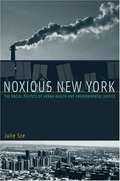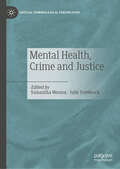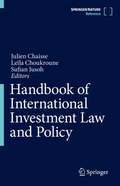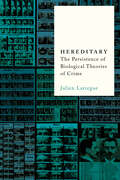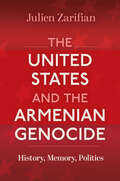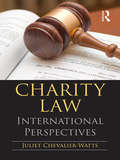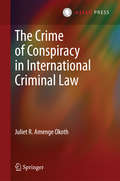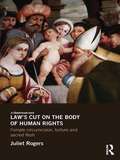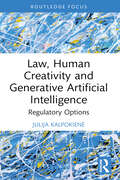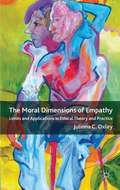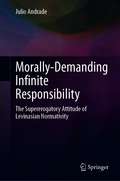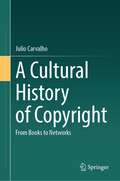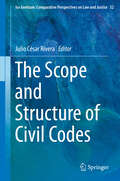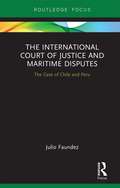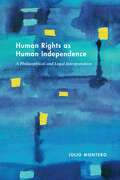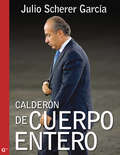- Table View
- List View
Noxious New York: The Racial Politics of Urban Health and Environmental Justice
by Julie SzeDrawing extensively on fieldwork and interviews with community members and activists, Sze illuminates the complex mix of local and global issues that fuels environmental justice activism.
Sustainability: Approaches to Environmental Justice and Social Power
by Julie SzeA critical resource for approaching sustainability across the disciplines Sustainability and social justice remain elusive even though each is unattainable without the other. Across the industrialized West and the Global South, unsustainable practices and social inequities exacerbate one another. How do social justice and sustainability connect? What does sustainability mean and, most importantly, how can we achieve it with justice? This volume tackles these questions, placing social justice and interdisciplinary approaches at the center of efforts for a more sustainable world. Contributors present empirical case studies that illustrate how sustainability can take place without contributing to social inequality. From indigenous land rights, climate conflict, militarization and urban drought resilience, the book offers examples of ways in which sustainability and social justice strengthen one another. Through an understanding of history, diverse cultural traditions, and complexity in relation to race, class, and gender, this volume demonstrates ways in which sustainability can help to shape better and more robust solutions to the world’s most pressing problems. Blending methods from the humanities, environmental sciences and the humanistic social sciences, this book offers an essential guide for the next generation of global citizens.
Mental Health, Crime and Justice (Critical Criminological Perspectives)
by Samantha Weston Julie TrebilcockMental Health, Crime and Justice brings together original and state of the art contributions from theoretical, empirical, and policy-related scholarship concerned with the ways people with mental health illnesses are understood, ‘managed’, ‘controlled’ and responded to. Drawing on critical scholarship from a variety of disciplines, the collection pays careful attention to the controversial relationship between mental health and crime, as well as key issues relating to justice and social harm. It presents a synthesis of discipline-specific approaches, from law, psychiatry, sociology, and criminology, but will also bridge together developments in both theory and practice. The book explores the relationship between mental health and crime by deconstructing and analysing two important facets of the justice system: (1) the various ways in which people with mental disorder navigate and are navigated through the criminal justice (and forensic mental health) system(s); and (2) how so called ‘problematised populations’ are governed, with a particular emphasis on mental health as an unfolding dimension of social harm. Unique to this volume, well-rehearsed debates are cross-examined with contemporary critiques about social harm and justice. By considering the multifaceted dimensions of violence to include ‘gendered’, ‘structural’, and ‘systemic’, this book provides a nuanced insight that exposes the controversial relationship that is said to exist between mental health and crime. The collection seeks to highlight the harm and injustice that people with mental health disorders are subject to when interacting with the criminal justice system.
Disclosure and Concealment in Consumer Insurance Contracts
by Julie-Ann TarrThis book provides an in-depth examination of the theoretical,legal, social and economic foundations to disclosure and concealment of information in relation to the formation of consumer insurance contracts. A comparative treatment of this issue is undertaken with particular attention given to the judicial and legislative approaches adopted in the United Kingdom, the United States of America, Australia and New Zealand. It will be relevant to those researching and studying insurance law, all legal practitioners involved with the formation of consumer insurance contracts and non-legal practitioners working within the field of insurance.
International Investment Protection within Europe: The EU’s Assertion of Control (Routledge Research in International Economic Law)
by Julien BergerThe steadily rising number of investor-State arbitration proceedings within the EU has triggered an extensive backlash and an increased questioning of the international investment law regime by different Member States as well as the EU Commission. This has resulted in the EU’s assertion of control over the intra-EU investment regime by promoting the termination of bilateral intra-EU investment treaties (intra-EU BITs) and by opposing the jurisdiction of arbitral tribunals in intra-EU investor-State arbitration proceedings. Against the backdrop of the landmark Achmea decision of the European Court of Justice, the book offers an in depth analysis of the interplay of international investment law and the law of the European Union with regard to intra-EU investments, i.e. investments undertaken by an investor from one EU Member State within the territory of another EU Member State. It specifically analyses the conflict between the two investment protection regimes applicable within the EU with a particular emphasis on the compatibility of the international legal instruments with the law of the European Union. The book thereby addresses the more general question of the relationship between EU law and international law and offers a conceptual framework of intra-European investment protection based on the analysis of all intra-EU BITs, the Energy Charter Treaty and EU law, as well as the arbitral practice in over 180 intra-EU investor-State arbitration proceedings. Finally, the book develops possible solutions to reconcile the international legal standards of protection with the regionalized transnational law of the European Union.
Handbook of International Investment Law and Policy
by Julien Chaisse Leïla Choukroune Sufian JusohThe Handbook of International Investment Law and Policy is a one-stop reference source. This Handbook covers the main conceptual questions in a logical, scholarly yet easy to comprehend manner. It is based on a truly global vision insisting particularly on Global South related issues and developments. In this respect, the Handbook of International Investment Law and Policy provides an excellent modern treatment of international investment law which is one of the fastest growing areas of international economic law. Professor Julien Chaisse, Professor Leïla Choukroune, and Professor Sufian Jusoh are the editors-in-chief of the Handbook of International Investment Law and Policy, a 1,500-page reference book, which is anticipated becoming one of the most influenced reference books in the international economic law areas. This Handbook is a highly comprehensive set of four volumes of original materials designed to cover all facets of international investment law and policy. The chapters, written by world-leading experts, explore key ideas and debates in relation to: international investment substantive law (Volume I), Investor-state dispute settlement (Volume II); interaction between international investment law and other fields of international law (Volume III); and, the new trends and challenges for international investment law (Volume IV). The Handbook will feature more than 80 contributions from leading experts (academics, lawyers, government officials), including Vivienne Bath, M. Sornarajah, Mélida Hodgson, Rahul Donde, Roberto Echandi, Andrew Mitchell, Ernst-Ulrich Petersmann, Christina L. Beharry, Krista Nadakavukaren Schefer, Leon Trakman, Prabhash Ranjan, Emmanuel Jacomy, Mariel Dimsey, Stavros Brekoulakis, Romesh Weeramantry, Nathalie Bernasconi-Osterwalder, David Collins, Damilola S. Olawuyi, Katia Fach Gomez, Jaemin Lee, Alejandro Carballo-Leyda, Patrick W. Pearsall, Mark Feldman, Surya Deva, Luke Nottage, Rafael Leal-Arcas, James Nedumpara, Rodrigo Polanco, etc. This Handbook will be an essential reference tool for students and scholars of international economic law. Policy makers and researchers alike will find the Handbook of International Investment Law and Policy useful for years to come.
Hereditary: The Persistence of Biological Theories of Crime
by Julien LarregueSince the 1990s, a growing number of criminal courts around the world have been using expert assessments based on behavioral genetics and neuroscience to evaluate the responsibility and dangerousness of offenders. Despite this rapid circulation, however, we still know very little about the scientific knowledge underlying these expert evaluations. Hereditary traces the historical development of biosocial criminology in the United States from the 1960s to the present, showing how the fate of this movement is intimately linked to that of the field of criminology as a whole. In claiming to identify the biological and environmental causes of so-called "antisocial" behaviors, biosocial criminologists are redefining the boundary between the normal and the pathological. Julien Larregue examines what is at stake in the development of biosocial criminology. Beyond the origins of delinquency, Larregue addresses the reconfiguration of expertise in contemporary societies, and in particular the territorial struggles between the medical and legal professions. For if the causes of crime are both biological and social, its treatment may call for medical as well as legal solutions.
The United States and the Armenian Genocide: History, Memory, Politics (Genocide, Political Violence, Human Rights)
by Julien ZarifianDuring the first World War, over a million Armenians were killed as Ottoman Turks embarked on a bloody campaign of ethnic cleansing. Scholars have long described these massacres as genocide, one of Hitler’s prime inspirations for the Holocaust, yet the United States did not officially recognize the Armenian Genocide until 2021. This is the first book to examine how and why the United States refused to acknowledge the Armenian Genocide until the early 2020s. Although the American government expressed sympathy towards the plight of the Armenians in the 1910s and 1920s, historian Julien Zarifian explores how, from the 1960s, a set of geopolitical and institutional factors soon led the United States to adopt a policy of genocide non-recognition which it would cling to for over fifty years, through Republican and Democratic administrations alike. He describes the forces on each side of this issue: activists from the US Armenian diaspora and their allies, challenging Cold War statesmen worried about alienating NATO ally Turkey and dealing with a widespread American reluctance to directly confront the horrors of the past. Drawing from congressional records, rare newspapers, and interviews with lobbyists and decision-makers, he reveals how genocide recognition became such a complex, politically sensitive issue.
Public Affairs: Politics in the Age of Sex Scandals
by Paul Apostolidis Juliet A. WilliamsPublic affairs--or sex scandals--involving prominent politicians are as revealing of American culture as they are of individual peccadillos. Implicated in their unfolding are a broad range of institutions, trends, questions, and struggles, including political parties, Hollywood, the Christian right, new communications technologies, the restructuring of corporate media, feminist and civil rights debates, and the meaning of public life in the "society of the spectacle. " The contributors to Public Affairs examine, from a variety of perspectives, how political sex scandals take shape, gain momentum, and alter the U. S. political and cultural landscape. The essays in Public Affairs reflect on a number of sex scandals while emphasizing the Clinton/Lewinsky affair, certainly the most avidly followed and momentous sex scandal in American political history. Leading scholars situate contemporary public affairs in the context not only of earlier sex scandals in American politics (such as Thomas Jefferson's and Sally Hemings's affair), but also of more purely political scandals (including Teapot Dome and Watergate) and sex scandals centered around public figures other than politicians (such as the actor Hugh Grant and the minister Jimmy Swaggart). Some essays consider the Clinton affair in light of feminist and anti-racist politics, while others discuss the dynamics of scandals as major media events. By charting a critical path through the muck of scandal rather than around it, Public Affairs illuminates why sex scandals have become such a prominent feature of American public life. Contributors. Paul Apostolidis, Jodi Dean, Joshua Gamson, Theodore J. Lowi, Joshua D. Rothman, George Shulman, Anna Marie Smith, Jeremy Varon, Juliet A. Williams
Charity Law: International Perspectives
by Juliet Chevalier-WattsThis work provides an analytical and comparative analysis of the development of charity law, as well as providing a critical commentary on a number of contemporary changes within the charity law field across a range of common law jurisdictions. The book follows earlier studies which cover a similar, and traditional, jurisdictional spread, but which are now dated. It further considers in detail charity law issues within Hong Kong and Singapore, about which there has been historically more limited charity law discussion. The area is growing in terms of practical legal and academic interest.
The Crime of Conspiracy in International Criminal Law
by Juliet R. Amenge OkothThis book looks at the relevance of conspiracy in international criminal law. It establishes that conspiracy was introduced into international criminal law for purposes of prevention and to combat the collective nature of participation in commission of international crimes. Its use as a tool of accountability has, however, been affected by conflicting conceptual perceptions of conspiracy from common law and civil law countries. This conflict is displayed in the decisions on conspiracy by the international criminal tribunals, and finally culminates into the exclusion of punishment of conspiracy in the Rome Statute. It is questionable whether this latest development on the law of conspiracy was a prudent decision. While the function of conspiracy as a mode of liability is satisfactorily covered by the modes of participation in the Rome Statute, its function as a purely inchoate crime used to punish incomplete crimes is missing. This book creates a case for inclusion in the Rome Statute, punishment of conspiracies involving international crimes that do not extend beyond the conceptual stage, to reinforce the Statute's purpose of prevention. The conspiracy concept proposed is one that reflects the characteristics acceptable under both common law and civil law systems.
Law's Cut on the Body of Human Rights: Female Circumcision, Torture and Sacred Flesh
by Juliet RogersScenes of violence and incisions into the flesh inform the demand for law. The scene of little girls being held down in practices of female circumcision has been a defining and definitive image that demands the attention of human rights, and the intervention of law. But the investment in protecting women and little girls from such a cut is not all that it seems. Law's Cut on the Body of Human Rights: Female Circumcision, Torture and Sacred Flesh considers how such images come to inform law and the investment of advocates of law in an imagination of this scene. Drawing on psychoanalytic and postcolonial theory, and accompanying ideas in political theology, Juliet Rogers examines the language, imagery and excitement that accompanies recent initiatives to legislate against what is called 'female genital mutilation'. The author compliments this examination with a consideration of the scene of torture exposed in images from Abu Ghraib and Guantanamo Bay. Rogers argues that the modes of fascination and excitement that accompany scenes of torture and female circumcision betray the fantasy of a political condition against which the subject of liberal law is imagined; this is subjectivity in a state of non-mutilation, non-prohibition or, in a psychoanalytic idiom, non-castration. To support the fantasy of this subject, the mutilated subject, the authors suggests, is rendered as flesh cut from the democratic nation state, deserving of only selective human rights, or none at all.
Good Company: How to Build a Business without Losing Your Values
by Julietta Dexter'What a joy! Inspiring and powerful.' -- Ruby WaxIn a highly competitive world, many think business success means being ruthless: maximising short-term return for shareholders, cutting overheads, crushing competition, and expanding at an exponential pace. Nothing says this more than Silicon Valley with its macho mantras like 'Move fast and break things' (Facebook) or 'We're a team not a family' (Netflix). But this model is looking increasingly flawed.What if there were another more compassionate way? Julietta Dexter believes there is. In this powerful and hopeful book, the award-winning CEO of The Communications Store explains how she built one of the world's most respected PR & communications companies without compromising her morals and without screwing over her staff or her clients. Highlighting a new paradigm for business, she explains why profit should be just one consideration among several, and why honesty, reliability and diversity are the best foundations for long-term success.
Corporate Liability for Insider Trading (The Law of Financial Crime)
by Juliette OverlandCorporate Liability for Insider Trading examines the reasons why there have been no successful criminal prosecutions, or successful contested civil proceedings, against corporations for insider trading, and analyses the various rationales for prohibiting insider trading. It reviews the insider trading regulatory regime and describes its key features, using both national and international examples. The book inspects a variety of criminal and civil models of corporate liability and considers the historical and theoretical basis on which corporations are subject to insider trading laws. The specific elements of the insider trading offence and the manner in which they are attributed to corporations are analysed in detail. Defences available to corporations such as Chinese Walls are explored, and the obligations that are imposed on businesses as a result of insider trading regulation – security trading policies and notifications, continuous disclosure obligations, and duties concerning conflicts of interest – are detailed and examined. The book concludes with reform proposals intended to remedy the many legal and commercial difficulties identified, in order that a new regulatory regime might be adopted to better serve regulators, businesses, investors, and the broader market. This volume addresses these corporate law topics and will be of interest to researchers, academics, financial institution compliance officers, investment bankers, corporate and comparative lawyers, and students and scholars in the fields of commercial law, corporate law, financial crime, company law, and white collar crime
Law, Human Creativity and Generative Artificial Intelligence: Regulatory Options
by Julija KalpokienėThis book addresses the complex issue of human creativity in the age of Artificial Intelligence.Artificial intelligence (AI) is increasingly being used to create texts, images, and musical compositions. This increase in the application of AI within the creative industries can of course enhance human performance while producing creative and commercial challenges for human authors. Against this background, this book considers how current mechanisms for incentivising creativity – including legal regulations, such as copyright, state funding and tax regimes – are inadequate in the age of AI. Acknowledging the opportunity that AI presents, the book then proposes alternative regulatory mechanisms through which human creativity can be incentivised.This book will appeal to scholars and researchers in the areas of socio-legal studies, intellectual property law, media law, and law and technology.
The Moral Dimensions of Empathy
by Julinna C. OxleyDoes empathy help us to be moral? The author argues that empathy is often instrumental to meeting the demands of morality as defined by various ethical theories. This multi-faceted work links psychological research on empathy with ethical theory and contemporary trends in moral education.
Morally-Demanding Infinite Responsibility: The Supererogatory Attitude of Levinasian Normativity
by Julio AndradeThis book presents a conceptual mapping of supererogation in the analytic moral philosophical tradition. It first asks whether supererogation can be conceptualised in the absence of obligation or duty and then makes the case that it can be. It does so by enlisting the resources of the continental tradition, specifically using the work of Emmanuel Levinas and his notion of infinite responsibility. In so doing the book contributes to the ongoing efforts to create a common ethical terminology between the analytic and continental traditions within moral philosophy. Supererogatory actions are praiseworthy actions that go ‘beyond duty’, and yet are not blameworthy when not performed. In responding to this paradox, moral philosophy either brackets or attempts a reductionism of supererogation. Supererogation is epitomised in the paradigmatic figures of the saint and hero. Yet, most would agree that emulating these figures is too morally demanding. We rightly ask: where does moral obligation end? Is it even possible, or desirable to demarcate such a boundary? Besides the important theoretical issues these questions raise, they also speak to practical ethical dilemmas in the contemporary milieu, as they concern the global wealthy’s responsibility to the poor and the challenges of development aid work.
A Cultural History of Copyright: From Books to Networks
by Julio CarvalhoCombining philosophical and historical perspectives, this book focuses on the rise of a legal institution that has dominated the economy of knowledge ever since it burst onto the scene at the dawn of modernity in the heartlands of Europe. From the age of print to the age of networks and disruptive technologies, this book explores the place of copyright amid the various conceptual transformations it has undergone over time. Uniquely, it presents an in-depth philosophical treatment of the cultural history of copyright from its beginnings to the present. Although copyright is a central topic, the content is by no means limited to it. The main question the author seeks to answer is: how do legal institutions emerge and how do they evolve over time? Though copyright is a wonderful example for tackling this question, a selection of other institutions, such as the social practice of promising in eighteenth-century Britain, are also addressed at considerable length. What the author has managed to show in this book is that the transformations which modern law has undergone since the eighteenth century are inextricably linked to those which have shaped the modern subject to the core. Law forms part of those great schemes of intelligibility that allow us to understand ourselves better. We need to delve deep into the multiple layers of culture if we want to fully understand how the morphology and cultural archaeology of our legal institutions intertwine.
The Scope and Structure of Civil Codes
by Julio César RiveraThis detailed analysis of the content and configuration of civil codes in diverse jurisdictions also examines their relationship with some branches of private law as: family law, commercial law, consumer law and private international law. It analyzes the codification, decodification and recodification processes illuminating the dialogue between current codes - and private law legislation in general - with Constitutions and International Conventions. The commentary elucidates the changing requirements of civil law as it shifted from an early protection of patrimony to a support for commercial and contractual law. It also explains the varying trajectories of civil law, which in some jurisdictions was merged with religious legal tenets in its codification of familial relations, while in others it was fused with commercial law or, indeed, codified from scratch as a discrete legal corpus. Elsewhere, the volume provides material on differing approaches to consumer law, where relevant legislation may be scattered across numerous statutes, and also on private international law, a topic of increasing relevance in a world where business corporations have interests in multiple jurisdictions (and often play one off against another). The volume features invited contributions from leading scholars in the field of private law brought together for an in depth analysis of the current regulatory attitude in this field of the law in jurisdictions with diverse legal systems and traditions. In current times we are witnessing the adoption of diverging regulatory solutions. Through the analysis of the past and present of private law regulation, the volume unveils the underlying trends and relevance of the codification method across the world.
The International Court of Justice in Maritime Disputes: The Case of Chile and Peru (Routledge Research on the Law of the Sea)
by Julio FaundezThe origins of the maritime dispute between Chile and Peru go back to 1952, when these countries, along with Ecuador, asserted sovereignty over 200 nautical miles from their coasts. This maritime claim is widely regarded as one of the most important contributions by a group of developing countries to the law of the sea. Peru then asked the Court of International Justice to delimit its lateral boundary with Chile in accordance with principles of international law. Chile asked the Court to dismiss the request. The question before the ICJ Justice was whether the treaty concluded by the parties when they made their claim had also delimited their lateral boundary. This book provides a critical analysis of the approach to treaty interpretation by the International Court of Justice in Maritime Disputes. Focusing on the case of Chile and Peru, the book explores two main issues: the interpretation of the Santiago Declaration and its connected treaties; and the tacit agreement that established a lateral maritime boundary with a seaward extension of 80 nautical miles. Part I argues that the Court’s finding that the Santiago Declaration did not delimit the lateral boundary is mistaken because it ignores its context, as well as its object and purpose. Part II argues that the finding that the parties had entered into a tacit agreement is an unjustified legal inference derived from a hasty interpretation of the Special Agreement of 1954. It questions that the reliability of the evidence used to determine the seaward extent of the lateral boundary and argues that the Court failed to demonstrate the bearing of contemporaneous developments in the law of the sea on the content of the tacit agreement.
¿Qué pasó en febrero de 1973?: A cincuenta años del comienzo del golpe de Estado
by Julio María SanguinettiMedio siglo después de los incidentes que anunciaron con claridad la inminencia del golpe de Estado, el Dr. Sanguinetti propone un texto clave para iluminar aquel período histórico cuyas resonancias aún nos afectan. Han pasado cincuenta años desde el “febrero amargo” de 1973. Los hechos que entonces se sucedieron mostraron el peor rostro de nuestra democracia, con fuerzas militares en la calle como no ocurría desde 1904. Este medio siglo de perspectiva nos dibuja nítidamente el comienzo del golpe de Estado que se consumaría cuatro meses después. La inédita tensión que se vivió entre el gobierno, la oposición, el Parlamento, los mandos militares y hasta la propia Justicia, configuraron una dura prueba para las instituciones y los actores políticos. Este libro propone una mirada alejada de las teorías interpretativas, que se atenga a “la majestad de los hechos”, al decir de Hanna Arendt, para iluminar un período histórico que aún influye en los debates contemporáneos. Al decir de su autor, el impulso creativo de este texto surge “ante la desconsoladora conclusión de cuántos jóvenes no tenían ni idea del comienzo del golpe de Estado de 1973”. El habitual estilo periodístico del Dr. Sanguinetti, ameno sin perder rigor histórico, se complementa con documentación escrita y gráfica, consolidando un libro fundamental para la comprensión de un hecho clave de nuestra historia reciente.
Human Rights as Human Independence: A Philosophical and Legal Interpretation (Pennsylvania Studies in Human Rights)
by Julio MonteroCan human rights be claimed against agents other than states, such as transnational corporations and global governance institutions? Does the authority of human rights depend on international law-making, or do they have a moral status that must be honored even in the absence of legal structures? What obligations do human rights impose on states acting across borders? What does it mean that the international community must work together to bring about their universal realization? Do we have human rights to abortion, same-sex marriage, and fully democratic government? What must individuals do for the human rights of others?Although these questions may be essential for the future of global politics and international relations, human rights doctrine offers no conclusive answers for them. In Human Rights as Human Independence, Julio Montero develops an original theory of human rights that helps us think about these and similar issues. Montero argues that human rights regulate the conduct of sovereign political agents both within and beyond borders, and that the aim of human rights norms is to protect everyone's fundamental moral claim to enjoy an equal sphere of agency to develop their personality.Human Rights as Human Independence offers a comprehensive, systematic, and complete account of the nature, sources, and scope of human rights that can be used to interpret international documents and make informed decisions about how human rights practice must be continued in the years to come. The book is thus of interest for a wide audience, ranging from philosophers and political theorists to lawyers, human rights scholars, and activists.
Comparative Constitutional Law and Policy: Constitutional Courts as Mediators
by Julio Ríos-FigueroaThis book offers a new theoretical framework for understanding the mediator role played by constitutional courts in democratic conflict solving. The book proposes an informational theory of constitutional review in which constitutional courts obtain, process, and transmit information to parties in a way that reduces the uncertainty causing their conflict. The substantive focus of the book is the role of constitutional courts in democracies where the armed forces are fighting internal armed conflicts of different types: Colombia, Peru, and Mexico in Latin America and also Israel, Turkey, and Pakistan. Through detailed analyses of the political context, civil-military relations, and the constitutional jurisprudence on military autonomy and the regulation of the use of force the book shows that constitutional courts can be instrumental in striking a democratically accepted balance between the exercise of civilian authority and the legitimate needs of the military in its pursuit of order and national security.
Calderón de cuerpo entero
by Julio Scherer GarcíaEn la plenitud de sus facultades como periodista y escritor, Julio Scherer García entrega un nuevo libro sobre el presidente en turno, que no sólo lo muestra "de cuerpo entero" sino que explica por qué durante el presente sexenio México ha vivido una de sus peores crisis, sumido en el estancamiento económico, el crecimiento de la pobreza, la corrupción y la violencia. «La política del presidente Calderón lo ha llevado por caminos peligrosos. Ante la historia es ya un hombre en entredicho.» En este libro Julio Scherer García exhibe una serie de documentos irrebatibles que muestran los ilícitos sobre los cuales tanto se ha hablado en torno al controvertido proceso que llevó a Felipe Calderón a la Presidencia de la República. Asimismo, propone un retrato completo de quien ha gobernado este país durante los últimos cinco años con los resultados que todos conocemos, reuniendo testimonios comprometedores y categóricos sobre el comportamiento discutible, por decir lo menos, del actual mandatario. El reportero, acucioso y consciente de la relevancia de su indagación periodística, se conjuga en estas páginas con el escritor dueño de su oficio y siempre comprometido con su experiencia personal, lo que le permite arrojar luz sobre temas como la traición o la muerte, tan presentes en este recuento terminante acerca de un presidente que concluye su mandato en medio de la desolación y la violencia.
El dolor de los inocentes
by Julio Scherer IbarraEste sólido análisis jurídico-político de la guerra del presidente Calderón contra el narcotráfico (muchos de ellos víctimas inocentes), tiene el propósito de acreditarle responsabilidades legales que eventualmente posibilitarían un juicio en su contra. ¿Quién paga por los inocentes? ¿Quién reivindica su muerte? Cincuenta mil muertos, diez mil desaparecidos. Muchos de ellos eran inocentes. Mexicanos y extranjeros que pasaban por ahí, que estaban en el lugar equivocado, que trataban de llevar su vida en paz, que se hallaron entre el fuego cruzado, que cayeron víctimas de ataques, operativos o levantones. En el marco de la guerra emprendida por el gobierno del presidente Felipe Calderón, las autoridades han hablado en innumerables ocasiones de "daños colaterales", pero nunca han afrontado la pregunta más urgente: ¿quién debe responder por las muertes de esos inocentes? En este esclarecedor análisis, Julio Scherer Ibarra aborda los fundamentos jurídicos y políticos del Estado como garante de la seguridad y el orden para establecer hasta dónde han fallado las directivas del combate al narcotráfico. Al optar por un enfrentamiento bélico, más allá de las atribuciones reales que la Constitución le brinda al Ejecutivo federal, y en detrimento de otras posibles soluciones como la suspensión de garantías en ciertas partes del territorio nacional, la violencia se exacerbó y terminó con las vidas de miles de inocentes. ¿Habrá manera de llamar a cuentas a aquellos que han engendrado tanto dolor? En busca de respuestas, el autor desmenuza las leyes nacionales e internacionales que nos rigen, con el propósito de establecer cuáles responsabilidades políticas, penales, administrativas y civiles pueden fincarse por la aciaga decisión unilateral de haber sacado al ejército de los cuarteles para enfrentar a la delincuencia organizada.
